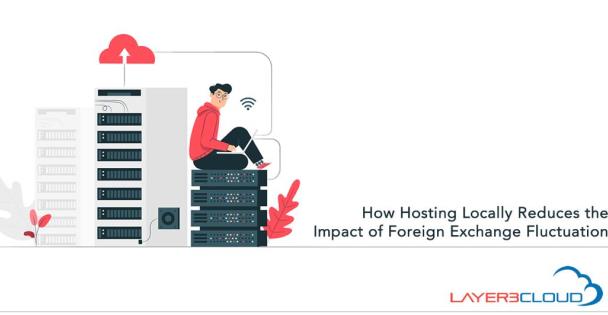E-Business
How Hosting Locally Reduces the Impact of Foreign Exchange Fluctuation

When organizations want to host their content, they look for a hosting platform that gives them efficient, high speed, and cost-effective service, so their content can be accessed quickly.
But while businesses and agencies in Nigeria have this same expectation, many unwittingly opt for service providers that cost them this speed and cost-effectiveness they crave. They host their data with foreign data centers.

Several consequences follow from hosting with foreign service providers. Upload and download times could be slower because the data centers are far away from the business that stores and accesses the data. There are data sovereignty issues as well; it’s not always clear whether it’s the business’s home country or the data center’s host country that has administrative rights over the data.
There’s another problem that businesses get exposed to when they use foreign hosting platforms. It’s a problem with unstable currency exchange rates.
The Exchange Rate Problem
Organizations also have to pay for the hosting services provided from beyond their borders in foreign currency. If a company in Nigeria hosts its content with a cloud firm in the United States, it will pay that firm for its services in dollars.
According to the Nigeria Internet Registration Association (NiRA), the country loses up to ₦60 billion worth of foreign exchange to other countries every year as payments for web hosting services. As of 2016, less than 2% of domain names were registered in Nigeria.
There’s a problem with this. If most establishments with a web presence in Nigeria rely on foreign hosting, they will be exposed to fluctuations in foreign exchange. If the dollar becomes more expensive relative to the naira, they will have to spend more to pay hosting fees.
Let’s explain this with a simple example.
Suppose Company A in Nigeria hosts its website with a hosting firm B in the United States. The Nigerian company A pays the hosting firm B $700 annually for its hosting services.
If the current dollar-naira exchange rate is ₦360 to $1, the Nigerian company will be spending an equivalent of ₦252,000 on hosting in one year.
But if the naira slumps and the exchange rate becomes ₦400 to $1, the Nigerian firm will have to pay ₦280,000 in hosting fees in a year.
That’s a difference of ₦28,000.
How a Fluctuating Exchange Rate Affects Business Hosting Budgets
One thing becomes immediately apparent: companies can’t be sure how much they will have to pay for hosting when they are drawing up their budgets. Even if the cost remains constant in dollar terms, the unstable exchange rate ensures that you can’t be certain about how much naira you will be set aside for it. This uncertainty makes planning difficult and may frustrate the efforts of businesses and agencies to streamline their expenses.
Higher costs also eat into budgets and reduce net business incomes. For organizations that consider their expenditure on this front as significant, a local currency that continually depreciates against the dollar could be eroding their efforts to turn out significant profits.
The Impact of Forex Payments for Hosting on Nigeria’s Economy
The exchange rate problem exerts significant pressure on the wider economic scale. Taken together, local companies are paying millions of dollars in scarce foreign exchange to foreign hosting firms. When these payments are made, Nigeria is left with fewer dollars. And when there are fewer dollars, the demand for them will push their naira-price higher.
Local companies suffer as a result. They may be paying the same rates in dollar terms, but they are spending more naira to make the payment.
In a nutshell, companies that use foreign hosting firms are contributing to a problem that they are already suffering from.
The Remedy: Local Hosting
There’s a solution to the uncertainty, rising costs, and economic problems that foreign hosting brings. It’s called local hosting. Instead of spending dollars on this service, companies in Nigeria can switch to local hosting firms.
Here are some advantages that businesses can gain from local hosting, in terms of exchange rate issues and costs.
- They won’t have to contend with fluctuating rates and the confusion that comes with it. They can simply pay for hosting in naira.
- Rates don’t ‘change’ abruptly. Customers will usually be notified when fees have been reviewed upwards or downwards.
- There’s greater certainty around the costs that the company is incurring.
- The fees are fixed and denominated in naira, so it’s easier to plan and budget.
- The country saves scarce foreign exchange.
There are also other benefits besides the gains from denominating fees in local currency. When you host your data locally, you have more access to it. It’s easier to keep in touch with the hosting platform. Security concerns are diminished. And there’s no concern about data sovereignty.
Local Hosting: What Options Do You Have?
As Nigeria has grown more reliant on data and digital technology, cloud service providers and managed IT service companies have sprung up within its borders to fill the storage and computing needs of its many businesses. Many of these have been around for just a few years. A few have been in operation for much longer.
The quality of service you get from local hosting firms will vary as well. Some can leverage their extensive experience in the Nigerian environment, and provide high-level skill and support to their clients. But this isn’t the case for every player in this space.
Layer3 is one of the long-lived data hosting institutions in Nigeria. For over 14 years, it has helped organizations in the private and public sectors with the data storage and network solutions they need to thrive. And it continues to improve its offerings, as technology evolves and the demands of the IT market change.
Its virtual data centers and servers, backup and disaster recovery services are available to emerging businesses, large corporations, and public sector agencies, and are tailored to suit organizations from a wide range of sectors.
If you would like to find out more about Layer3 and local hosting, you can contact our team here.
E-Business
Kike, Nigerian Tech Firm Launches ‘Kike AI’ for Kitchen Innovation

Kike Technologies, a Nigerian technology firm, has launched ‘Kike AI’, a revolutionary artificial intelligence-driven kitchen application designed to transform Nigeria’s food and cooking gas industries.

The app aims to enhance convenience for consumers while optimising gas supply through predictive technology.
Speaking at the launch event, Femi Oye, CEO of Kike Technologies, highlighted the app’s ability to address a common household issue, unexpected depletion of cooking gas.
“Using advanced algorithms and data analytics, this app can forecast when a user’s gas cylinder is running low, enabling them to order refills ahead of time,” Oye explained.
Beyond individual household benefits, Kike AI is expected to have a broader economic impact by creating jobs within the logistics, gas retail, and food industries.
“We anticipate significant job growth as the app gains traction, particularly in delivery and gas station services,” Oye noted.
The app is also designed to bridge the digital gap, specifically targeting women and marginalised groups by providing them with opportunities to showcase their culinary skills and earn a sustainable income.
According to Oye, this initiative will not only empower women economically but also help preserve Nigeria’s rich culinary heritage.
By leveraging AI technology, Kike AI aims to revolutionise everyday cooking experiences, support economic development, and create essential employment opportunities in Nigeria’s growing tech and food sectors.
The application is expected to drive a shift towards more efficient cooking gas management, ensuring affordability and ease of access for millions of users.
E-Business
Africa’s Data Workers are Being Exploited by Foreign Tech Firms – Report

Data workers in Africa often have a hard time, according to a report published in theconversation.com, a nonprofit, independent news organization dedicated to unlocking the knowledge of experts for the public good.

The article by Mohammad Amir Anwar, senior lecturer in African Studies and International Development, University of Edinburgh, found that data workers in Africa face job insecurities – including temporary contracts, low pay, arbitrary dismissal and worker surveillance – and alarming physical and psychological health risks.
The consequences of their work can include exhaustion, burnout, mental health strain, chronic stress, vertigo and weakening of eyesight.
Data work includes text prediction, image and video annotation, speech to text validation and content moderation.
The world of data work is built on labour arbitrage – exploiting the fact that workers earn less and have less protection in some countries than in others.
Large technology firms often outsource this work to the global south, including African countries like Kenya, Uganda and Madagascar, and also India and Venezuela.
The result is complex production networks that are generally opaque and shrouded in secrecy.
Workers and researchers have issued many warnings about data workers’ health.
Despite numerous court cases in multiple jurisdictions, nothing much has been done to address these issues either by tech companies or by regulators.
Still, the news of the death of a Nigerian content moderator, Ladi Anzaki Olubunmi, who was found dead in her apartment in Nairobi, Kenya on 7 March 2025, came as a shock.
While the circumstances of her death are still unclear, it has renewed calls for wider systemic change.
Her death has sparked condemnation from the Kenyan Union of Gig Workers, which demanded an investigation.
Since 2015, we have been studying the central role of African data workers in building and maintaining artificial intelligence (AI) systems, acting as “data janitors”.
Our research found that companies rarely acknowledge the use of human workers in AI value chains, thus they remain “hidden” from the public eye. In other words, the world of AI is built on the toil of human workers most people are unaware of.
In this article, we outline key steps needed to protect these data workers in Africa.
They include business process outsourcing regulations, ensuring quality rather than quantity of jobs, and providing social protection. There is also a need to name and shame companies that maltreat data workers.
Data work needs tighter regulation.
Regulation
Business process outsourcing is the practice of procuring various processes or operations from external suppliers or vendors.
Firms that do this are sometimes trying to evade local regulations (like minimum wages) and responsibility towards workers’ welfare (via sub-contracting and the use of temporary employment agencies).
This is happening in Africa as some data training firms and digital labour platforms circumvent local labour laws.
But there is more to the story.
Data work is also seen by lawmakers and practitioners as a solution to the rampant unemployment and informality across Africa.
African governments have actively created regulatory environments that enable these practices to thrive, despite adverse outcomes for workers.
Nonetheless, new regulations have been proposed lately, like the Kenyan government’s Business Law (Amendment) Bill, 2024 targeting the wider business process outsourcing and IT-enabled services sector.
Particularly, it makes business process outsourcing firms responsible for any claim raised by employees. It ensures some accountability for firms bringing data work to Africa.
Other governments should follow with similar measures ensuring worker rights are enforceable. Some data workers are hired on contracts as short as five days and get paid less than the local minimum wage.
Firms found violating labour standards should be penalised.
In fact, there is an urgent need to create regional or continent-wide regulatory frameworks covering the business process outsourcing sector, limiting the space for firms to exploit workers.
It’s possible, however, that jobs might be lost as firms relocate to places with favourable laws, an everyday reality in the outsourcing networks.
Quality, not quantity
African governments should prioritise the quality of jobs and not quantity. Policymakers should think about wider national economic development plans, particularly structural diversification and upgrading of their economies.
Historically, these strategies have resulted in success in some states, addressing social and economic issues such as unemployment, poverty and inequality.
Another option for African governments is to enhance social protection among data workers.
Financing this is a serious issue, so proper taxation and compliance among workers and employers is urgently needed.
Finally, there is a role for naming and shaming firms that treat their data workers poorly. There is evidence that such efforts improve compliance and firms’ behaviour.
Worker movements
African data workers have taken risks in openly speaking about their experiences.
But these kinds of approaches work well when combined with collective bargaining.
Workers have historically won their labour and civil rights after long and hard-fought struggles.
There is a long history of African worker movements and trade unions resisting the apartheid and colonial regimes across the continent.
While the freedom of association is enshrined in the African Charter on Human and Peoples’ Rights and most governments have legislation committed to collective bargaining, it is rarely implemented in the new outsourcing sectors, particularly data work.
It is also difficult to organise workers in the industry, because of the high churn rate. For instance, data training firms like Sama offer short-term contracts to employees, often as short as five days.
Some firms are hostile to workers’ organising activities.
But numerous data worker-led associations have emerged in Africa recently, some led by the co-authors of this article.
Techworker Community Africa, African Tech Workers Rising, African Content Moderators Unions and Data Labelers Association are among them.
These initiatives are crucial to ensure workers have decent remuneration, work-life balance, adequate working hours, protection against arbitrary dismissal, safe working environments, and contributions towards their health and welfare.
Several high-profile court cases are currently being pursued by African data workers against Meta and Sama.
There is precedent. In 2021. Meta was ordered by a Californian court to pay US$85 million to 10,000 content moderators.
AI-dependent tools such as ChatGPT or driverless cars would not exist without African data workers. They are tired of being “hidden”. They deserve to be treated with respect and dignity.
Mophat Okinyi, Kauna Malgwi, Sonia Kgomo and Richard Mathenge co-authored this article.
E-Business
NIMC Says NIN Mandatory to Government Loans

National Identity Management Commission (NIMC) said the National Identification Number (NIN) is a mandatory requirement for securing government loans.

NIMC said on its social media platform that the identity number has become compulsory for Bank of Industry (BOI) loans.
NIMC said, “Enroll for your NIN today to access business aid and other opportunities from the Bank of Industry.
“To access the services of the Bank of Industry (BOI), enroll for the NIN.”
Recall that the federal government, through the Federal Ministry of Industry, Trade, and Investment (FMITI), established three funds totaling N200bn to support businesses across Nigeria.
The fund will be accessed at nine per cent interest, to be disbursed by the Bank of Industry (BOI).
The funds established by the government were the Presidential Conditional Grant Scheme (PCGS), the FGN MSME Intervention Fund, and the FGN Manufacturing Sector Fund.
The government appointed BOI as the executing agency for the funds and is empowered with the responsibility for their day-to-day administration.
“The Presidential Conditional Grant Scheme (PCGS) is a N50bn grant scheme to support eligible Nano Business owners. The grant will be disbursed to a minimum of 1,000 beneficiaries, especially women and youths, per Local Government Area (LGA) in the 774 LGAs across the nation and the six Council Areas in the FCT.
“The target Nano businesses include traders, food vendors, ICT businesses, transporters, artisans, and creatives, among others,” said Dr. Olasupo Olusi, managing director/chief executive officer, BOI.

 Broadcasting2 days ago
Broadcasting2 days agoDStv Revenue Plunges as MultiChoice Loses Nearly 4m Subscribers

 News1 day ago
News1 day agoNIPSS Projects Petrol Prices to Hit ₦750/Litre Before Year’s End!

 Telecom2 days ago
Telecom2 days agoNCC Asks Consumers to Monitor Data Usage to Authenticate Consumption

 Telecom2 days ago
Telecom2 days agoPhone Theft: AMCODET Urges Mandatory Registration @ Point of Purchase

 News2 days ago
News2 days agoTikTok Sale Deal Expected Before April 5 Deadline – Trump

 News2 days ago
News2 days agoQuestions Over House of Reps Threat to Arrest NIMC DG

 E-Financial2 days ago
E-Financial2 days agoFidelity Bank Records a 210.0% Growth in PBT to N385.2bn

 Telecom2 days ago
Telecom2 days agoCassava and Microsoft Boost Youth Employment in Green Tech

























